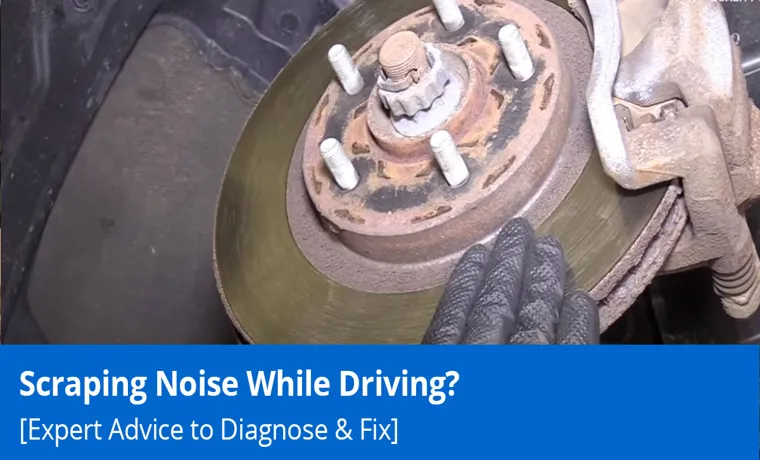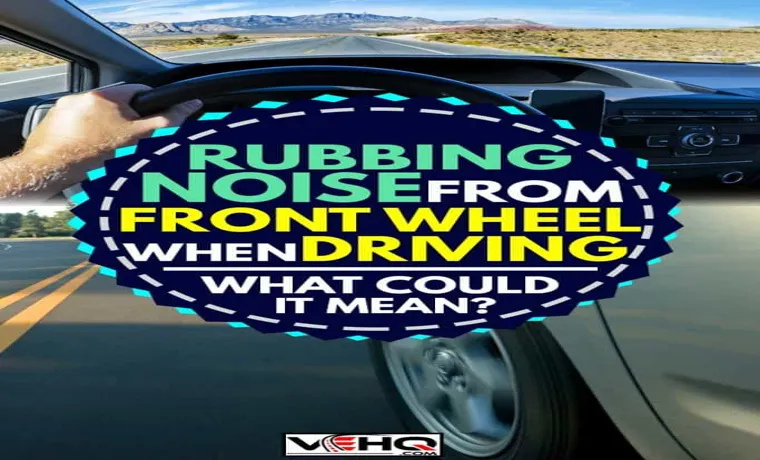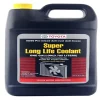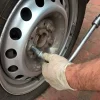Have you ever heard a strange noise coming from your car’s tires as you’re driving down the road? Maybe you’ve noticed that your tires are rubbing against something, causing a thumping or grinding sound that’s hard to ignore. This issue could be caused by several factors, from worn suspension components to incorrect tire size. Whatever the cause, having your tires rub while driving is not only alarming, but it can also damage your vehicle and decrease its overall performance.
In this blog, we’ll explore the various reasons why your tires might be rubbing while driving, how to diagnose the issue, and what steps you can take to fix it. So if you’ve been wondering what’s causing that annoying sound coming from your tires, read on to find out more!
Table of Contents
Possible Causes of Tire Rubbing
If you hear a tire rubbing sound when driving, it can be quite alarming and concerning. The most common cause of this issue is having tires that are too large for your vehicle’s wheel well. This happens when you try to upgrade your wheels to a larger size than what the manufacturer recommends.
Another cause could be worn out suspension parts, such as shock absorbers or struts, that cause the vehicle to sit lower than normal and make contact with the tire as you go over bumps or dips in the road. It’s also possible that your vehicle may have been in an accident, causing the frame to become misaligned and leading to tire rubbing. Lastly, tire pressure that’s too low can cause the outer edge of the tire to wear unevenly and create a rubbing noise.
It’s important to have a mechanic inspect your vehicle if you hear a tire rubbing sound to determine the cause and make the necessary repairs.
Worn Out Tires or Wheels
One of the potential causes of tire rubbing is worn out tires or wheels. This occurs when the tires have worn down over time, making them smaller in diameter than they once were. As a result, the remaining clearance between the tire and other components of the vehicle, such as the wheel well or suspension, becomes insufficient.
This can lead to the tire rubbing against these components during turns, bumps, or when the vehicle is carrying a heavy load. In extreme cases, worn out tires can also cause wheel imbalance or misalignment, leading to further issues with the vehicle’s handling and stability. To prevent tire rubbing due to worn out tires or wheels, it is important to regularly inspect and maintain your tires, including checking for signs of wear and tear, proper inflation, and balancing.
Replacing worn out tires or wheels when necessary can also go a long way in preventing this issue.

Misaligned Suspension System
One of the possible causes of tire rubbing is a misaligned suspension system. This occurs when the angle and position of the wheels and tires are not set correctly, causing them to scrape against the vehicle’s body or other parts. A misaligned suspension system can happen due to various reasons such as hitting a curb or pothole, worn-out suspension components, or improper installation of suspension parts.
If you notice that your tires are rubbing or making a screeching noise, it’s essential to have your suspension system checked by a professional mechanic. Failure to address this issue can lead to more severe problems, including uneven tire wear and reduced handling and performance. Overall, regular maintenance and checking of your suspension system can help prevent tire rubbing and ensure a safer and more comfortable driving experience.
Loose or Broken Suspension Parts
One possible cause of tire rubbing in your vehicle could be loose or broken suspension parts. Your suspension system is responsible for absorbing shock and keeping your tires planted firmly on the road. If any of the parts become damaged or worn out, it can affect the position of your wheels and cause them to make contact with other parts of your car.
This can result in a rubbing or scraping noise while driving. Make sure to regularly inspect your suspension components and have them replaced if necessary to prevent this issue. Don’t ignore these warning signs, as continuing to drive with a damaged suspension system can lead to even more serious problems in the long run.
A well-functioning suspension system not only ensures a smooth ride, but also keeps you and your car safe on the road.
How to Identify Tire Rubbing
Do you hear a strange rubbing sound coming from your wheels while driving? If so, it could be a sign of tire rubbing, which occurs when the tire physically makes contact with other parts of your car. To identify tire rubbing, you may notice the sound becoming more pronounced when turning or when there is added weight in the car. You may also see visible signs of rubbing on the tire’s sidewalls or other parts of the vehicle, such as scuff marks on the fender.
It’s important to address tire rubbing as soon as possible, as it can cause damage to the tire and affect the car’s alignment and suspension. If you suspect tire rubbing, take your car to a mechanic for inspection to determine the root cause and find a solution before it turns into a costlier issue.
Visual Inspection
Tire rubbing can be identified through a visual inspection of your tires’ condition. One of the first signs of tire rubbing is the appearance of uneven wear or bald spots on one or both sides of the tire. This occurs when the tire comes into contact with another part of the vehicle, such as the fender or wheel well.
You may also hear a scraping or rubbing sound coming from the affected area while driving. In extreme cases, you may feel a vibration or wobbling while driving at higher speeds. It is important to address tire rubbing promptly as it can lead to further damage to your tires and vehicle.
By regularly checking the condition of your tires and seeking professional assistance if you suspect any tire rubbing, you can prevent costly repairs and ensure your vehicle’s safety on the road.
Test Drive
Test Drive If you’re experiencing tire rubbing, it’s important to identify the cause as it can lead to damage to your tires and suspension system. One way to identify tire rubbing is by listening for a noise that sounds like a scraping or rubbing against the wheel well while driving or turning. Another way is to inspect the tire for any visible signs of wear or damage on the sidewall.
Pay attention to the tread pattern and look for areas that have been worn down unevenly. Additionally, take a close look at the wheel well to see if there are any areas that have been scratched or scraped. If you suspect that your tires are rubbing, it’s important to have your vehicle inspected by a professional mechanic as soon as possible to prevent further damage and ensure your safety on the road.
At the end of the day, a proper test drive can help you identify any issues with your vehicle before they turn into major problems.
How to Fix Tire Rubbing
Are you hearing a tire rubbing sound when driving? This can indicate that your tires are rubbing against something, causing damage and potentially hazardous driving conditions. There are a few ways to fix tire rubbing, depending on the source of the issue. Firstly, check your tire pressure to ensure that it is at the recommended level.
If the pressure is too low, the tires will sink more into the pavement and rub against the wheel well. If that’s not the problem, inspect the tires for any signs of damage or bulging. If there is damage, it’s best to replace the tire.
Another potential issue is the suspension system, which can cause the tire to rub against the wheel well if it’s not properly aligned. It’s recommended to take your car to a mechanic to inspect and fix any issues with the suspension. Overall, it’s important to address tire rubbing sounds as soon as possible to ensure safe driving conditions.
Replace Worn Out Tires or Wheels
If you’ve noticed your car tires rubbing against the wheel well, it’s important to take action immediately to prevent further damage. Tire rubbing can occur due to a variety of factors, ranging from worn out tires, improper wheel alignment, or a bent suspension. To remedy the issue, start by inspecting the tires for signs of wear and tear.
If the tread is worn unevenly, it may be time to replace the tires with new ones. Alternatively, you may need to adjust the wheel alignment or replace any damaged suspension components. Ignoring the problem can lead to decreased performance, reduced fuel efficiency, and increased risk of accidents.
By staying proactive and addressing tire rubbing promptly, you can ensure that your car remains safe and reliable on the road.
Get Suspension System Alignment
If you’ve noticed that your tires are rubbing against the wheel well or suspension system, then it’s time to fix the problem before it becomes worse. One of the most common underlying issues that cause this problem is suspension system misalignment. To fix tire rubbing, you need to ensure that your vehicle’s suspension system is aligned correctly.
Misalignment occurs when the suspension system is not perpendicular to the road’s surface. This can lead to wear and tear on your tires, as well as discomfort while driving. To ensure that your suspension system is correctly aligned, take your car to a reputable mechanic who can inspect your vehicle’s suspension system and perform any necessary adjustments.
In addition to fixing tire rubbing, getting your suspension system aligned correctly also leads to a smoother ride and better handling. So, don’t wait until the problem worsens. Get your suspension system checked and aligned today to avoid any unwanted expenses and ensure your safety on the road.
Repair or Replace Loose or Broken Suspension Parts
Tire rubbing is a common problem that many automotive owners face. It occurs when the tire rubs against the car’s body or suspension components, which can cause damage to both the tire and the vehicle. The root cause of tire rubbing can be due to a variety of reasons, but one of the most common reasons is loose or broken suspension parts.
When these parts fail, they can cause the vehicle to sag, and the tires can rub against the body or the wheel well. To fix tire rubbing, you must first identify the root cause of the problem. Once you have determined that the issue is due to broken or loose suspension parts, you can then repair or replace them.
Some of the most common suspension parts that can cause tire rubbing include ball joints, control arms, tie rods, and sway bar links. These components work together to keep your vehicle’s suspension in check, and a failure in any one of them can cause damage to your tires. Repairing or replacing suspension parts is best left to a professional mechanic who is experienced in dealing with automotive suspensions.
They will be able to diagnose the problem accurately and provide a proper solution. Replacing suspension parts may involve a significant investment of both time and money, but it is essential for maintaining the safety and integrity of your vehicle. It is always better to tackle the problem early on, rather than waiting for it to worsen and cause further damage.
In conclusion, repairing or replacing loose or broken suspension parts is an essential step in fixing tire rubbing. If you’re experiencing this issue, it’s essential to determine the root cause and get it fixed as soon as possible. Don’t wait for the problem to worsen and cause more damage to your vehicle.
Contact a professional mechanic today and get your suspension checked out. It will not only save you time and money but also ensure that your vehicle is safe to drive.
Prevent Future Tire Rubbing
If you hear a tire rubbing sound when driving, it’s important to address the issue quickly to prevent further damage. Tire rubbing can lead to uneven wear or even a blowout if not taken care of properly. One common cause of tire rubbing is when the wheels are misaligned, causing the tire to hit the fender.
To prevent future rubbing, make sure to get your wheels realigned regularly. Another cause of rubbing can be worn suspension components. Check your suspension for any signs of damage or wear, such as cracks or leaks, and replace any parts as needed.
Additionally, make sure your tires are properly inflated and that the correct size tires are installed on your vehicle. By taking these preventative measures, you can avoid hearing that annoying tire rubbing sound and ensure a safer and smoother ride for yourself and your passengers.
Regular Maintenance
Regular maintenance is essential for any vehicle to stay in good condition. When it comes to tire rubbing, preventive measures can save you a lot of money in future repairs. Start by checking your tire pressure once a month and aligning your wheels at least once a year.
This will ensure that your tires wear evenly and won’t rub against any parts of your vehicle. Another way to prevent tire rubbing is to keep your suspension system in good shape. Make sure to have your shocks, struts, and steering components checked regularly by a professional mechanic.
When these parts start to wear out, they can cause your vehicle to lean or sag, leading to tire rubbing. Lastly, if you’ve made any modifications to your vehicle, such as adding larger tires or wheels, make sure that they have enough clearance and aren’t rubbing against any body parts or fenders. Regular maintenance and inspections can help you identify potential problems early and save you from costly repairs down the road.
Avoid Overloading Your Vehicle
One of the key factors that can cause tire rubbing is overloading your vehicle. It might be tempting to pile up all your belongings or equipment and take them along on your trip, but this can result in serious damage to your tires and vehicle. When your vehicle is carrying too much weight, it puts pressure on your tires, causing unnecessary friction and wear.
To avoid future tire rubbing, always check the manufacturer’s recommended weight limits for your vehicle and stick to them. Before embarking on a journey, make sure you remove any unnecessary or heavy items from your vehicle. This will not only help you avoid tire rubbing but also improve your vehicle’s overall performance, fuel efficiency, and safety.
Remember, staying within your vehicle’s weight limit can save you time, money, and headaches in the long run.
Conclusion
So there you have it folks, if you’re hearing a tire rubbing sound when driving, don’t just brush it off as a minor annoyance. It could be a sign of serious issues like worn-out suspension components or misaligned wheels. Plus, let’s be honest, listening to that sound for hours on end will make anyone tire-d (pun intended).
So, get your car checked by a professional mechanic and make sure you’re back on the road with a smooth and silent ride. And who knows, you might even save yourself from more expensive repairs down the road. “
FAQs
What causes a tire rubbing sound when driving?
There are a few possible causes of a tire rubbing sound when driving, including worn brake pads, a damaged wheel bearing, or misaligned wheels.
Can driving with a tire rubbing sound cause further damage to the vehicle?
Yes, driving with a tire rubbing sound can cause further damage to the wheels, tires, and suspension system. It’s essential to address the issue promptly to avoid costly repairs.
How can I determine which tire is making the rubbing sound?
You can determine which tire is making the rubbing sound by paying attention to the direction from where the sound is coming. The sound will usually be louder when turning in one direction.
How much does it cost to fix a tire rubbing sound?
The cost to fix a tire rubbing sound depends on the underlying cause. Replacing worn brake pads can cost $150-$300, while replacing a wheel bearing can cost $300-$500.
Can a tire rubbing sound be fixed at home, or should I take it to a mechanic?
It’s best to take your vehicle to a mechanic to diagnose and fix the cause of the tire rubbing sound. Attempting to fix the issue at home without proper knowledge or tools could cause further damage.
How often should I have my car’s wheels aligned?
It’s recommended to have your car’s wheels aligned once a year or every 10,000 miles to prevent issues like tire rubbing sounds.
Is it safe to continue driving with a tire rubbing sound?
No, it’s not safe to continue driving with a tire rubbing sound. The underlying issue can cause further damage to your vehicle and compromise your safety on the road.



